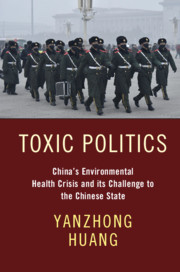Book contents
- Praise for Toxic Politics
- Toxic Politics
- A Council on Foreign Relations Book
- Toxic Politics
- Copyright page
- Dedication
- Contents
- Figures
- Tables
- Acknowledgments
- Abbreviations
- Introduction
- Part I The Health and Nonhealth Impacts
- Part II The Government Response
- Chapter 3 Evolving Environmental Health Policy
- Chapter 4 Implementing Environmental Health Policy
- Chapter 5 An Assessment of Policy Effectiveness
- Conclusion
- Notes
- Index
Chapter 5 - An Assessment of Policy Effectiveness
from Part II - The Government Response
Published online by Cambridge University Press: 18 September 2020
- Praise for Toxic Politics
- Toxic Politics
- A Council on Foreign Relations Book
- Toxic Politics
- Copyright page
- Dedication
- Contents
- Figures
- Tables
- Acknowledgments
- Abbreviations
- Introduction
- Part I The Health and Nonhealth Impacts
- Part II The Government Response
- Chapter 3 Evolving Environmental Health Policy
- Chapter 4 Implementing Environmental Health Policy
- Chapter 5 An Assessment of Policy Effectiveness
- Conclusion
- Notes
- Index
Summary
Analysis in this chapter supports an overall trend of decline in the percentage of polluted days since 2012. Yet, stricter and more centralized policy enforcement measures do not have truly significant, across-the-board effects in reducing pollution in China, and the fall in PM2.5 concentration has not translated into significant and sustained health benefits. The chapter also examines the success and failure of the government in tracking the ongoing targets it set for achieving final policy goals, paying special attention to the following issue areas: reduction of toxic emissions, attacking water pollution, energy, and industrial restructuring, policy coordination, public participation, and the use of market mechanisms. The mixed outcome in addressing air pollution highlights the constraints and flaws of China’s environmental governance model. It also suggests that decades of reform and opening up have not fundamentally changed the impromptu, non-participatory, unaccountable, and mobilizational policy process, which often leads to undesirable and unintended policy outcomes.
Keywords
- Type
- Chapter
- Information
- Toxic PoliticsChina's Environmental Health Crisis and its Challenge to the Chinese State, pp. 149 - 184Publisher: Cambridge University PressPrint publication year: 2020

